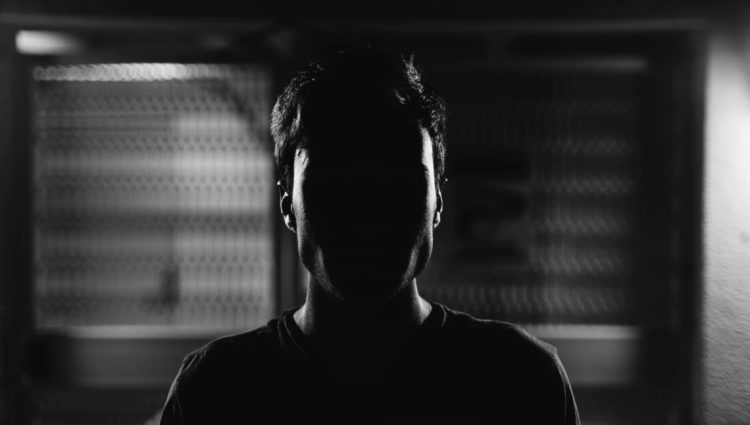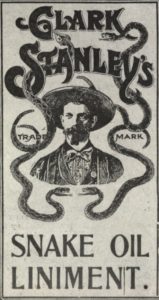
From time to time, Appalachia Bare likes to spotlight some of our best submissions. “Louis” was written by talented storyteller, Kipper Evans, and was the Second Prize winner of Appalachia Bare‘s 2020 George Washington Harris Short Story Contest. We are proud to present this story for your enjoyment.
Kipper Evans is a husband and father of two young boys. He loves poetry and literature, and “Louis” is his first submission. He is an 8th generation Blount Countian and lives in the same house he grew up in. His ancestors rest in a cemetery near his home, from Great to 6th Great-Grandparents. Both sides of the Civil War, War of 1812, and Revolutionary War grandfathers are all buried there. He loves genealogy, Southern antiques, privacy, and his family.
Louis
Louis Maldibble was a snake oil salesman. At least that’s what my Daddy called him. But I didn’t know what that meant when I was twelve. I thought he was talking about the stuff Louis put in his hair. He kept a black-toothed comb sticking out of his back pocket and he would keep his hair combed and slicked back with, what I discovered later, was a homemade pomade. He would mix possum grease, and bee’s wax, and who knew what else into his ritual concoction. But I always knew the possum grease. If it was too warm when you were standing near him, you could taste a little of what you were smelling. I knew it well because my Granny always forced me to swallow some with a bit of sugar whenever I had the croup, and I used to wonder if death weren’t the better option.
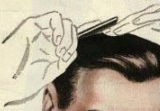
Louis didn’t live here before the Great War. He just kind of showed up with what fellows came back. I can’t say how he was before, but I got the impression that he was different now. He would jerk his chin a bit toward his left shoulder and blink quickly sometimes. Louis was noticeably pale, and probably had to shave twice a day. He was always combing his black hair with that snake oil. My Dad didn’t want me around him. “The Devil favors left-handed people,” he said to me. I asked Louis once if he was left-handed, and he said “I’m ambidexters. . .”, but I could see how much larger his left bicep was coming out from under his rolled-up shirt sleeve.
Louis helped me out once. I had started having trouble out of a bully when I was about ten. Jimmy would go out of his way to call me out or embarrass me, and he was never alone. He was also three years older than me, even though we were in the same grade. I kept thinking as I got bigger, I’d show him. But I was hardly growing, and he just kept putting on muscle and size. His daddy had a bad reputation, and had been some kind of fighter, or at least a brawler. Louis saw Jimmy and his ragtag cronies back me into a corner one day. Louis wasn’t much bigger than Jimmy, but he managed to shoo them away anyway, presumably because of his age. “Do you want me to show you how to stop that?” Louis asked me. I would have normally stayed away from him like my Dad wanted, but the shame of those hot tears running down my flushed face forced out a muffled: “Yes.” So Louis started working with me after school.
He told me that the key was not to fight like you were expected to. He said if there are two armies, then it was silly for the weak one to line up across from the strong one and swap shots, and that fighting was no different. He began to teach me to fight Southpaw. Instead of left hand and foot forward, we started practicing the opposite, and it felt as backwards as could be. Louis said there were lots of advantages to fighting this way. Namely my dominant hand wouldn’t need to be wound up for a coup-de-grace that could be seen coming and evaded. A short jab from my right would be faster, stronger, and better controlled. But the most important thing was my feet, Louis said. “When someone fights a Southpaw, they just flat don’t know where to put their feet. They fall all over themselves.”
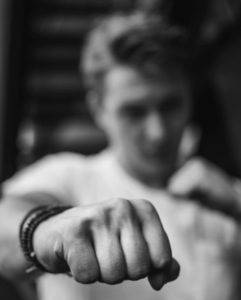
Louis was always willing to make time for me, and we practiced almost every day. My thoughts would inevitably wander to how disappointed my parents would be if they thought I wasn’t just playing with friends. But Louis was a kind of friend. He mostly spoke with purpose, and assumed the role of educator, although he never discussed the war. He also seemingly never took it easy on me. When he would spar with me, he would circle, bob and weave, then snake in and tap me in the stomach or ribs. In retrospect, he never hit me with full power, and never put knuckles to my face. He would use the back of his hand to issue kind of a broad, reprimanding slap to enlighten me of my fault. Some days he would have me do the same combination of punches over and over. “Muscle memory” he called it. “If you can build muscle memory, it all becomes a reflex and you don’t have to put any thought into it,” he said.
One day I had been working on the same combination of punches for over an hour, when I had an epiphany. I no longer cared about putting Jimmy in his place. In fact, I didn’t care about Jimmy at all. I felt capable, and confident, and the future seemed wide open. When Jimmy called me a name in passing one day, I just smiled and ignored him. There was none of the dread that usually came on. I half expected to be hit from behind, but no attack came. For no particular reason, the bullying I had taken for so long just kind of dried up.
Some weeks later, on a Friday, I stayed a few minutes late after school, hoping to get to talk to a girl. But being overly shy, I abandoned my attempt and headed for Miller’s Pond, where I would sometimes meet Louis to do a little fishing. When I was almost to the water, I heard a commotion to my right on a little dirt road. I looked up to see Jimmy laughing as Jerry held a gangly kid from our school by the arms, and Todd delivered a blow to his gut that sounded like dropping a bag of flour. Before I even knew I was involved, I had closed the gap and hit Todd with a quick jab that dropped him right on his butt. Jerry just stared in disbelief. Jimmy, being a man of action, had already sent a vicious blow to the side of my ear that left the world all topsy-turvy for a second.
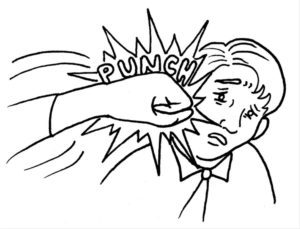
I leapt back a couple of steps, and narrowly dodged a follow up right cross. I countered with my own right hook, and caught Jimmy just hard enough to see him get serious. But when I started moving my feet, he began to look unsure. I hit him with a jab that made his lip bleed. He tried to swap punches with me a couple of minutes, but it was clear I was getting the better of him. He rushed me, and wrapped his muscular arms around my middle, and I could feel my back and ribs acting like they wanted to break. He started to lift me off the ground, his hot, stinky breath blowing hard in my face. Desperate, I slapped both his ears at the same time with the palms of my hands. He dropped me with a grunt and recoiled, and I came up hard with a punch that started from my waist, and might have been a left hook if he weren’t so much taller than me. His upper lip exploded against his teeth, and would become a permanent scar. He had so much blood coming out that he just pressed his hands to his mouth, and half jogged away. I don’t know what happened to the other boys. I was trembling and I felt sick. I might have thrown up if it hadn’t been so long since I ate. I looked up toward the water, and I could see Louis leaned against a tree in the shadow, a couple of fishing rods at his feet. His face didn’t show any emotion at all.
I went over near him and sat down. I was ashamed I was crying, but I couldn’t stop the sobs. Louis never said a word. He cast his line out into the water like a dutiful fisherman, and in fact, it might have been where he got most of his meals. I sat with my head against my arms, and my arms across my knees. Its peculiar how moments of great importance can make you oblivious to some things, and keenly aware of others. I didn’t know what became of the other boys in the aftermath of my fight, but despite my mood, I was keenly aware of the changing sky. It was one of the best of my life. Golds, and crimsons, with some wispy deep blue clouds. All of it mirrored in the placid water. Miller’s Pond was much closer to being a lake, and I think it was fed by a couple of springs. After a couple of mosquitos buzzed my ears, I became aware of an engine shutting off not far away. I heard a car door. I looked around for Louis, but I didn’t see him anywhere. His fishing rod was still propped in a stick, but I had been so enamored with the sky I never even noticed him leave.
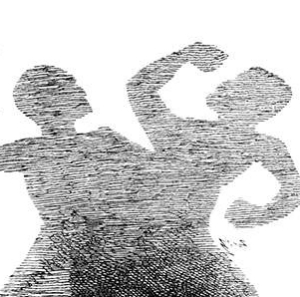
A gruff voice called out: “Hey!” I turned and saw a large man, thick with slabs of muscle heading my way across the same dirt road I had just fought on. “Are you the little bastard that took a stick to Jimmy?” It was Jimmy’s father. He was walking faster. His hand was in his pocket, probably stuffing down his keys, but in my mind he was going for a gun. I started to get up, terrified, when Louis reappeared. “Are you this boy’s father?” Jimmy’s dad asked. “Yup” was the only thing that Louis said. Jimmy’s dad threw a big haymaker at Louis’ head without any warning, but Louis backed away from it easily. He threw punch after punch, and Louis evaded them all. It was as if he were coated in the same snake oil he put in his hair. After what seemed like forever, the big man began to get winded, and after throwing a particularly angry right, Louis kicked him sideways in the knee, and he fell to one leg. We had never practiced with anything but hands, and in my child’s mind, Louis had violated some rule of honor. Then Louis hit him across the cheekbone with an elbow. Then a flurry of fists. Louis was standing over him, holding him by the collar, and hitting him in the face with an inhuman viciousness. He was muttering something I couldn’t understand. “Louis, please!” I shouted. “You’re going to kill him!” Louis jerked his head up at me, eyes blazing, catching the last crimson and gold of the sunset. He dropped the bigger man, now unconscious, to the ground. He pulled out his comb, and combed his hair. He went back over to his fishing rod, and leaned back against the tree.
I walked home. I ran occasionally to burn up nervous energy, but mostly I walked. I fretted over what would happen next, and what my folks would say. I went in the back door of our house, careful not to step on the weak part of the step that would groan, or to let the door slam. I went to our tiny wash room, blessedly vacant, and looked in the mirror at my red ear and flushed face, covered with road dust. I washed my face. I wet my hair and combed it as best I could. When I went into the living room, my mother had her sewing machine out making a gingham dress. I sat down on the sofa beside her, clearly not in a mood to talk, but willing to watch to try and forget my own problems. My silence prompted her to talk about what she was doing. “You always start with the right side of a dress,” she said with a hint of song in her voice, “the left invites the Devil”.
**Featured Image by Malik Earnest on Unsplash
